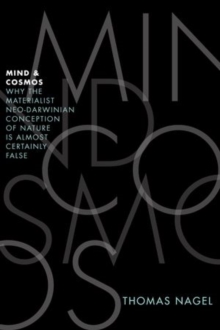Description
| Product ID: | 9780199919758 |
| Product Form: | Hardback |
| Country of Manufacture: | US |
| Title: | Mind and Cosmos |
| Subtitle: | Why the Materialist Neo-Darwinian Conception of Nature is Almost Certainly False |
| Authors: | Author: Thomas Nagel |
| Page Count: | 144 |
| Subjects: | Philosophy of mind, Philosophy of mind, Philosophy of religion, Religion and science, Philosophy of science, Philosophy of religion, Religion & science, Philosophy of science |
| Description: | Select Guide Rating In Mind and Cosmos, Thomas Nagel argues that the widely accepted world view of materialist naturalism is untenable. The mind-body problem cannot be confined to the relation between animal minds and animal bodies. If materialism cannot accommodate consciousness and other mind-related aspects of reality, then we must abandon a purely materialist understanding of nature in general, extending to biology, evolutionary theory, and cosmology. In Mind and Cosmos Thomas Nagel argues that the widely accepted world view of materialist naturalism is untenable. The mind-body problem cannot be confined to the relation between animal minds and animal bodies. If materialism cannot accommodate consciousness and other mind-related aspects of reality, then we must abandon a purely materialist understanding of nature in general, extending to biology, evolutionary theory, and cosmology. Since minds are features of biological systems that have developed through evolution, the standard materialist version of evolutionary biology is fundamentally incomplete. And the cosmological history that led to the origin of life and the coming into existence of the conditions for evolution cannot be a merely materialist history. An adequate conception of nature would have to explain the appearance in the universe of materially irreducible conscious minds, as such. No such explanation is available, and the physical sciences, including molecular biology, cannot be expected to provide one. The book explores these problems through a general treatment of the obstacles to reductionism, with more specific application to the phenomena of consciousness, cognition, and value. The conclusion is that physics cannot be the theory of everything. |
| Imprint Name: | Oxford University Press Inc |
| Publisher Name: | Oxford University Press Inc |
| Country of Publication: | GB |
| Publishing Date: | 2012-11-22 |
